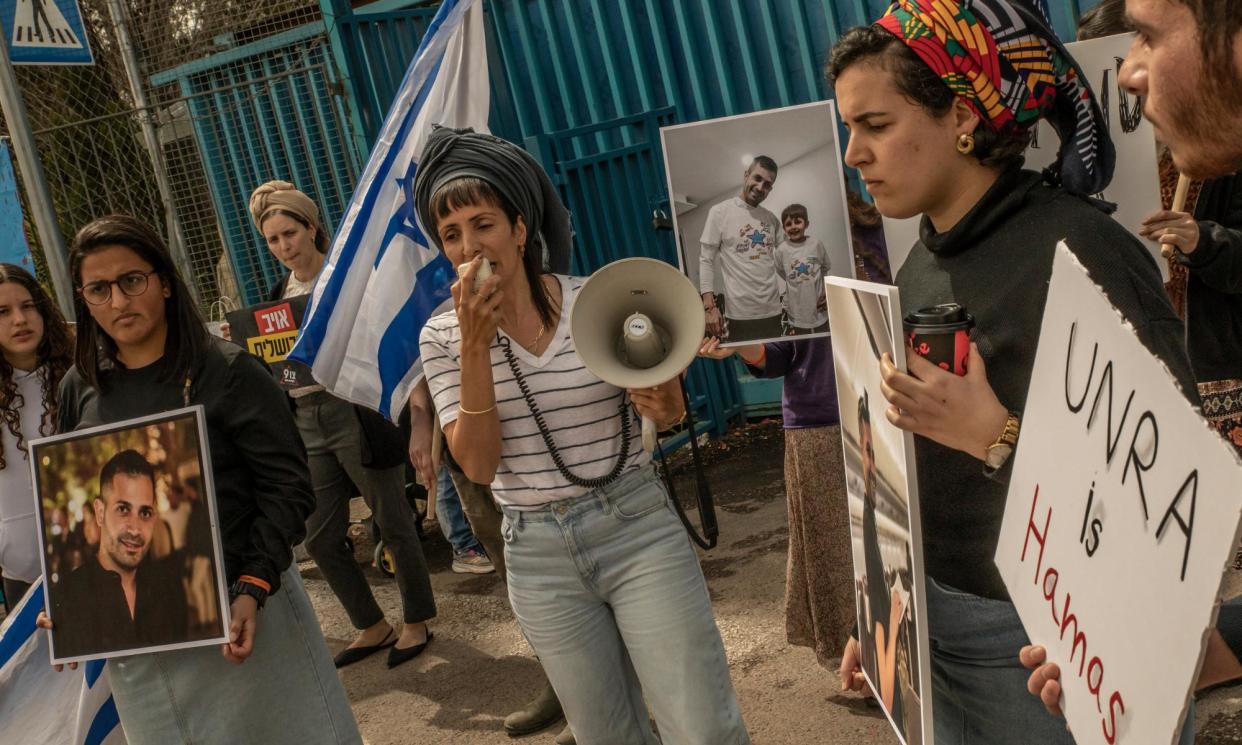Israeli settlers call for UN agency’s closure in Jerusalem protest

Dozens of Israeli settlers and rightwing activists have protested by again blocking the entrances of the UN agency for Palestinian refugees (Unrwa) office in Jerusalem and calling for the body’s closure.
Last week, Israel announced it would no longer approve Unrwa food convoys to the north of Gaza, where the threat of famine is highest. The decision came after the agency was accused by the government of collaborating with Hamas in Gaza, with its staff facing a systematic campaign of obstruction and harassment by the Israeli military and authorities, as revealed in internal UN documents seen by the Guardian.
Unrwa was founded in 1949 to provide healthcare, food, and education to Palestinian refugees, with 5.9 million of them relying on its services. It employs about 30,000 Palestinians, 13,000 of them – mostly teachers – in Gaza.
On Wednesday, a group of settlers, activists, and members of the rightwing extra-parliamentary political group Im Tirtzu staged a protest for the third week in a row, fixing posters to the building and demanding that the agency be abolished.
“Unrwa needs to be disbanded,” said Aynat Libman, a 52-year-old Israeli settler from Efrat. “Israel doesn’t need to provide space to Unrwa in our capital. They support terror, teach children from a very young age to be terrorists, provide support to Hamas, and supply Hamas. They are terrorists.”
Israel has accused Unrwa staff members of participating in the 7 October attack and called the agency “a front for Hamas”.
The UN has launched an internal and an independent investigation but has said Israel has not provided it with any evidence to support the claims against its staff.
A US intelligence assessment of Israel’s claims that UN aid agency staff members participated in the 7 October attack reportedly assessed with “low confidence” that a handful of staff had taken part, indicating that it considered the accusations to be credible but that it could not independently confirm their veracity. It cast doubt, however, on accusations that the UN agency was collaborating with Hamas in a wider way.
The protesters expressed their anger over the UN resolution on the ceasefire in Gaza, describing it as an attack against Israel.
“The UN and [António] Guterres should be ashamed of themselves,” added Libman. “They are antisemitic, and there is no other way to say it.”
Rightwing supporters and settlers have previously attempted to block aid trucks from entering Gaza at the Nitzana border crossing, and this is not the first time settlers and rightwing activists have targeted the UN agency by placing threatening posters on the main entrance and calling for it to be shut down.
“We want the Israeli government to expel Unrwa from Israel,” said Roei Ben Dor, 21, from Gedera. “Unrwa is Hamas; their workers are affiliated with Hamas. We should be in Gaza, not just because of Hamas but because Gaza is ours. We have every right to take Gaza, to take Rafah. This is our land.”
Among the protesters was Aryeh King, a deputy mayor of Jerusalem and a prominent advocate for settlements.
“We need to transfer all of them [all Palestinian residents] out of Gaza,” King said. “Because Hamas is the people of Gaza.”
Juliette Touma, the director of communications for Unrwa, said: “From time to time, groups of rightwing settlers come to our headquarters shouting insults at our staff. This must be stopped. We are a UN agency and deserve respect.”
UN staff working with Palestinians in the occupied West Bank have faced obstruction and harassment from the Israeli military and authorities since the conflict in Gaza began five months ago, according to internal UN documents obtained by the Guardian.
The documents record hundreds of incidents ranging from the alleged blindfolding and beating of UN staff at checkpoints to the use of UN facilities by Israeli troops as firing positions during raids on refugee camps in which Palestinians were killed.
After the Israeli government’s decision to prevent the agency’s aid deliveries in northern Gaza, Philippe Lazzarini, the head of Unrwa, condemned the move, calling it intentional obstruction of lifesaving assistance during a human-made famine.
Gaza faces dire humanitarian conditions as a result of Israel’s war against Hamas, which was triggered by Hamas’s deadly attack on southern Israel on 7 October.
Last week a UN-backed food security assessment warned that famine was projected to hit the north of Gaza by May unless there was urgent intervention. Unrwa has not been able to deliver food to the north since 29 January, Touma said.
Martin Griffiths, the head of the UN humanitarian coordination office, said Unrwa was the “beating heart of the humanitarian response in Gaza”.
“The decision to block its food convoys to the north only pushes thousands closer to famine,” he added. “It must be revoked.”
On Tuesday 30 April, 7-8.15pm GMT, join Devika Bhat, Peter Beaumont, Emma Graham-Harrison and Ghaith Abdul-Ahad as they discuss the fast-developing crisis in the Middle East. Book tickets here or at theguardian.live


